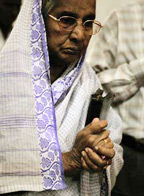Church leads visitors on a walk-through journey to Bethlehem_122004
Posted: 12/10/04
Church leads visitors on a walk-through journey to Bethlehem
By Michael Leathers
Associated Baptist Press
SPRINGFIELD, Ill. (ABP)—With just a portable heater as defense against the cool night, Kendra Jackson waits for the next group of Christmas celebrants to arrive. The 30-something mother of two daughters is portraying Anna in the interactive Christmas drama produced by Western Oaks Baptist Church.
Jackson has never acted before, unless you count bit parts in her high school's production of "Li'l Abner." But she's been involved in the Western Oaks production, "Journey to Bethlehem," for the past three years because it "attracts people to church and helps them celebrate the season better."
The walk-through drama, told in nine scenes, has been performed by Western Oaks for the last five Decembers. Some 300 church members are involved in every aspect of the drama—from construction of outdoor and indoor sets in the fall to baking thousands of cookies for visitors. Even the script is locally written, tailored for the layout of the church.
While many churches stage living nativities and choir cantatas for Christmas, Western Oaks Pastor Jeff Blevins wanted the church to try a different approach—something unique that would be a gift to the community.
The answer was an interactive play. Visitors are taken through a tour of the Christmas story, led by a wise man searching for the location of the birth of the Christ child. The traveling audience follows their guide through the journey's nine scenes in and around the church. The audience interacts with different characters, each one revealing a little information they need to find the birthplace of Jesus.
"By making it an interactive journey, people feel like they participate in the story and in the journey," said D.J. Shultz, director of worship and music at Western Oaks.
That's important, because visitors are reminded in the final scene that "we're all on a journey" to find Christ—a journey that continues after they leave the church, he added.
This season, Western Oaks transformed its lobby into Herod's court, complete with a running fountain. Visitors are greeted and then sent through the drama in groups of 15 to 25 each. On busy nights, groups are dispatched every four minutes. Actors like Jackson may perform their scenes up to two dozen times in one evening.
Other characters include Zechariah, an excitable priest who is delighted to have visitors after losing and regaining his speech when his son, John the Baptist, was born. They meet Herod, who assigns a skeptical servant to tour with the group as they search for Jesus. They find help from a beggar child in a bustling marketplace. A merchant tells them about a star that another caravan of travelers had been following.
The tour ends with a reflective stop at the Bethlehem manger. There, Herod's servant tells the travelers she cannot return to Herod because she has been changed by the story of the newborn Messiah.
About 120 church members serve as cast and crew each night during the six-night production over two weekends. Last year, more than 4,200 people attended, the highest attendance of the five-year run. The church rewrites the story each year, adding new scenes and retiring some characters to keep the drama fresh for return visitors.
The interactive drama has been spreading to other churches. Calvary Baptist Church of Alton, Ill., planned a three-night performance of its own version of "Journey to Bethlehem.” The church sent about a dozen members to Western Oaks last year to attend a production. "Having the opportunity to see it done was so much more helpful than just reading it on paper," said Rick Patrick, the church's minister of education. The church is incorporating a living nativity into its production.
Blevins said one strength of the drama is that it brings families together to slow down for a few moments and reflect "in a world where we're racing toward Christmas."
Another strength, he said, is the drama's life-changing potential. One 19-year-old man, who was halfway through a drug rehab program, talked to Blevins after the drama because he was having serious questions about his life and purpose. He later made a decision to commit his life to following Jesus Christ.
The drama strengthens church members as well.
"I see our people coming alive and serving," Blevins said. "That's what we're designed to do."




